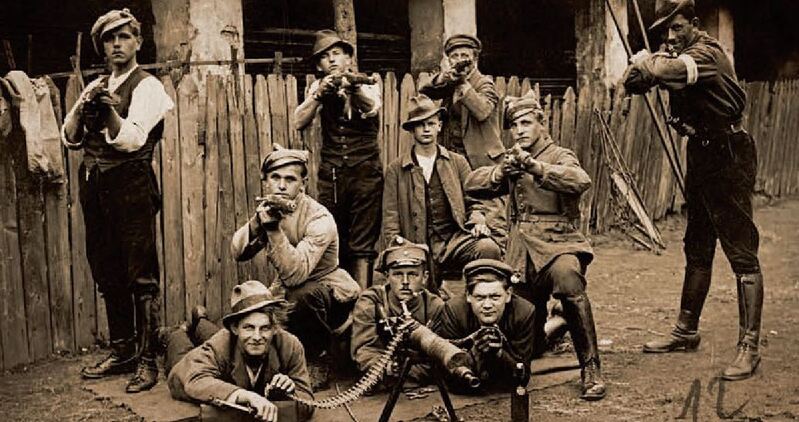The largest and most widely read press titles participated in the main political games of the powers interested in a favourable outcome to the Upper Silesian conflict.
The outbreak of the uprising, preceded by the destruction of the railway lines, was connected with cutting off the plebiscite area from free information transmission via telephone and telegraph lines. In the first week of the uprising, information reached readers of press from Opole, Katowice and Bytom via the allied troops and interested Polish and German political centres, through Warsaw and Berlin. In France, England and the United States, it was unanimously agreed that the incoming information was far from credible and distorted by propaganda, differing only by ascribing disinformation to the German or the Polish side. The British Daily Telegraph admitted that in the first three days, only German reports had reached London, while at the same time writing about the effective propaganda of Polish agitators in Upper Silesian industrial plants. The daily Le Matin emphasised the Berlin provenance of the telegram which contained false information about the Entente states’ decision to grant the plebiscite territory to the Germans, which enraged the Polish miners.
The extraordinary momentum of the uprising was widely emphasised. The New Zealand daily Hokitika Guardian reported on the superior numbers of the insurgents advancing towards the Oder River. In Ulster, The Northern Wig, hostile towards Poles, described well-organised and disciplined insurgent units marching through the cities under the nose of the humiliated Allied troops. The influential French daily Le Temps, meanwhile, emphasised the proper armament of the insurgent army, thanks to Korfanty’s purchase of the Orsgesch weapon supplies. The French daily La Croix denied the news about Polish soldiers participating in the uprising, even going so far as to insinuate that the insurgents disarmed by the French turned out to be German saboteurs. Intrasingeant reported on a correction issued by the Chancellor, forced to admit that there was no proof of Polish presence, “although there [was] no doubt” about Polish support for the uprising. In the opinion of the French press, citing Polish sources, the 100,000-strong insurgent army was merely a local levée en masse. For the British Pall Mall and Globe, the insurrection was a “rebellion in Polish uniforms”, although the American correspondent of The New York Times noted mainly German rifles and French or American uniforms of insurgent officers near Bytom.
News about Upper Silesia attracted readers’ attention due to the clash of the superpowers taking place in the shadow of the insurrection. The British press had no doubts that Korfanty had played va banque, with the support of Warsaw and Paris behind him, playing for a division of the plebiscite territory that would be most favourable for Poland. The Dundee Courier, quoting London politicians, explained that the dictator’s play was aimed at gaining control over Upper Silesia and making the decisions of the Supreme Council worthless. The Daily Herald published a text interspersed with statements by the British Prime Minister, containing harsh words against Korfanty and the Republic of Poland: “The children of the Treaty of Versailles cannot be allowed to break the crockery of Europe with impunity”. Someone must place a restraining hand on them, otherwise there will be continual trouble”.
Lloyd George’s provocative speech, seen as a camouflaged attack on the politics of Paris, caused fury on the Seine. The most important French dailies wrote about Polish self-defence, directed against the Germans who, after being granted the entire plebiscite territory, would trigger a war of retaliation against France and Poland. A published statement by MP Henry Paté dispelled any doubts as to the true intentions. France sought to strengthen its ally in case of danger to itself.
The MP warned that no ratification of the agreement with German would be possible in France if it entailed harm to Poland, just as Lord d’Abernon did in London, warning that it was not possible to ratify any agreement on reparations without granting all of Upper Silesia to Germany.
The Italian La Tribuna, quoting the words of Foreign Affairs Minister Carlo Sforza called for everyone to come to their senses and base the decision on respecting the results of the plebiscite, while taking into account Polish aspirations and protecting German interests. The end of the Entente was widely heralded when the British Prime Minister, speaking of the great unanimity of the Entente (England, Italy and the US) did not mention France among its member states! However, what caused the greatest fear was a real outbreak of a pan-European armed conflict over Upper Silesia if the situation was prolonged and did not calm down. British correspondent Phillips Price warned that German entry into Upper Silesia would set in motion dangerous social and national consequences in the form of overt Polish support for the uprising.
At the same time in Saigon, the daily L’Écho annamite called attention to the words of Minister Briand, who said that it was the French and Italian armies (and not the British!) who had to make their own efforts of restoring peace in the mines.
The war of nerves lasted until the end of June 1921.
Ryszard Mozgoł,IPN Katowice
